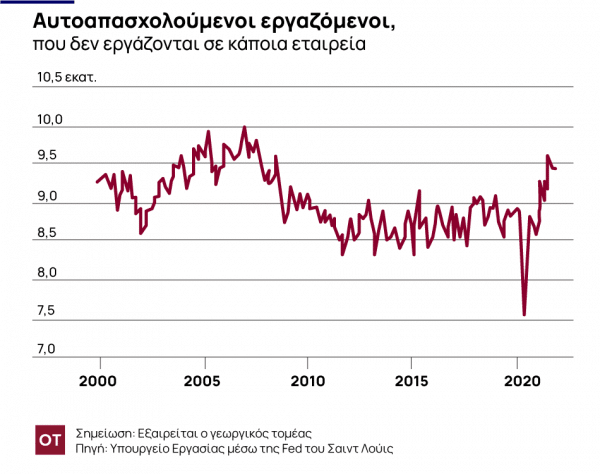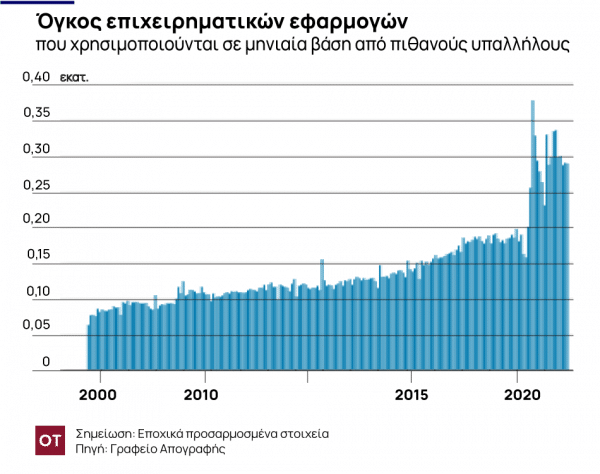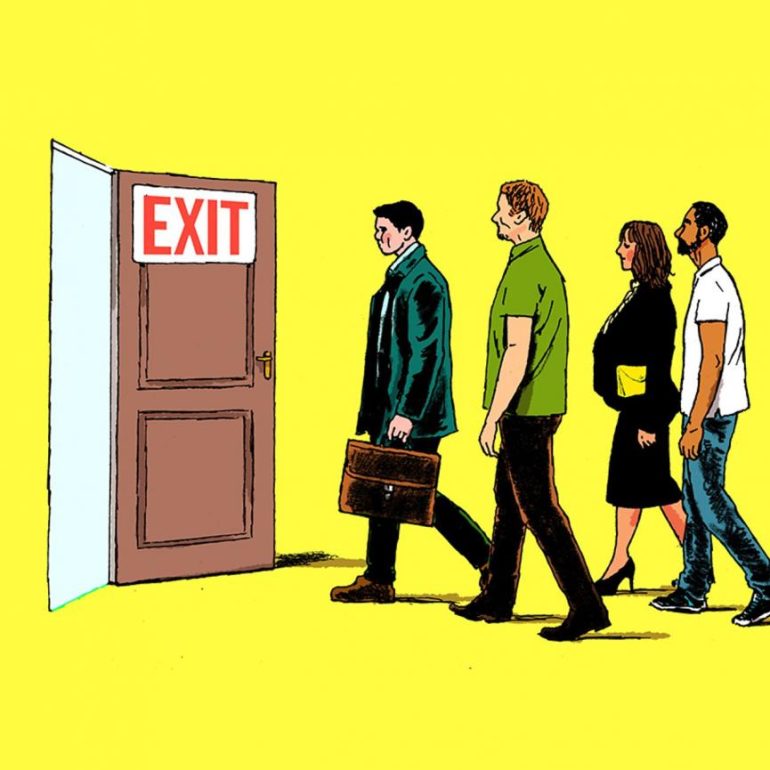The pandemic has created an unprecedented explosion in entrepreneurship and self-employment. Hundreds of thousands of Americans are now competing in the job market as consultants, retailers and small business owners.
This new trend explains the ongoing turmoil in the world of work, as more and more workers want to be flexible, anxious about their exposure to the coronavirus, disagree with mandatory vaccinations or say they are frustrated with office life before the pandemic breaks out. This new situation has also exacerbated labor shortages in some sectors and is putting pressure on companies to renew their employment policies.
The number of self-employed, who do not work in a company, has increased by 500.000 since the outbreak of the pandemic, according to data from the Ministry of Labor, reaching 9,44 million. This is the highest number since 2008, when the financial crisis broke out, with the exception of this summer, marking a 6% increase in the self-employed, with employment as a whole in the US falling by 3% compared to with pre-pandemic levels.

Entrepreneurs applied for federal tax registration numbers to register 4,54 million new businesses from January to October this year, an increase of 56% over the same period in 2019, according to the Census Bureau. . This was the highest percentage recorded in records dating back to 2004. Two-thirds were companies that are not expected to recruit new employees.
This year, the share of U.S. employees working for a company with at least 1.000 employees fell for the first time since 2004, according to the Department of Labor. Meanwhile, the proportion of self-employed workers in the United States has risen to a 11-year high. In October, they accounted for 5,9% of employees in the US, while in February 2020, 5,4%.

The increase in self-employment coincides with complaints from many companies in America about the difficulties they face — in some cases extreme — in finding and retaining enough employees. In September, workers in the US resigned from 4,4 million jobs, setting a new record, according to the Department of Labor.
Kimberly Friedl, 50, resigned as head of marketing for a regional mortgage company near Dallas in September 2020. Her sixth- and eighth-grade daughters struggled with distance learning, and after months of pandemics, began to show up. symptoms of severe anxiety. Although her employer showed understanding, she wanted to have flexibility so that she could help her daughters, without having to deal with zoom meetings and various projects from her work.
Mrs. Friedl intended to stay home indefinitely, with the help of her husband, a pharmaceutical company executive. But when a friend contacted her a month later, she was given a new chance.
Her boyfriend sold the decorations from his home in Canada to Amazon.com, but border restrictions due to the coronavirus made it difficult to control returns. When she explained to her what she needed - most notably someone to check the items returned for damage and resend them to Amazon - Ms. Friedl thought this job would be a good challenge and opportunity for her eldest daughter, Samantha, to to gain some experience.
They accepted her friend's offer and started checking the returns. When other Amazon sellers he knew needed help with their warehouse, as they too were experiencing significant difficulties due to the pandemic, he referred them to Ms. Friedl.
Today, she runs an Amazon logistics, warehousing and ordering business from her home outside Houston, while also renting a warehouse nearby. Her eldest daughter works with her about 10 hours a week, and she recently hired an assistant. She also hopes to expand her services to Walmart vendors.
In July, her monthly family income returned to about the same level as when she was working in marketing, Ms. Friedl said. Although her decision to resign was emotional, she said, the change she made, after 27 years, gave her energy and confidence, in addition to the flexibility she needed.
"I had no plans when I left," she continued. "I did not pay enough attention to the needs of my family. I did not pay enough attention to the work that had to be done. "I felt I had failed in all areas."
Now, "I feel very successful and every day I wake up I'm wondering what will happen today".
By the end of the 19th century, most Americans worked for themselves as farmers or artisans. With new technology, such as electric lighting, production expanded and most people stopped working with nature as they began to orient themselves to new jobs in factories. But they landed in an environment with strictly defined working hours and hierarchies — with employees supervised by their managers, who in turn are supervised by company executives.
When the coronavirus broke out in the US, the emergence of applications, websites and companies that served entrepreneurs and freelancers gave new opportunities to employees.
The pandemic then prompted some employees to "take a break and re-evaluate their priorities," said Aaron de Smet, a senior associate and consultant at McKinsey & Co. for trends at work.
Marcus Grimm, 50, of Lancaster, Pennsylvania, had just started working in advertising agencies after graduating from university. For years, he flirted with the idea of a freelancer. "I always thought about it, but I never had the courage to make this move," he said. "I was afraid I would lose my sleep worrying about how to make money."
At the beginning of the pandemic, Mr. Grimm, married, father of two older children, was fired. He subscribed to Upwork, a site that brings together freelancers from a wide range of industries with potential clients. He did a lot of outside work, mainly doing advertising campaigns for large companies, charging a fairly low price per hour.
Businesses were liquid. It has steadily increased its price, to $ 150 per hour. Mr. Grimm himself claims that he now earns more than his old job, in which he was paid $ 130.000 a year.
What he likes most is that he does not have to deal with company policy or any other bureaucracy. He can even kayak in the middle of the day.
"I am the one who finds the client, I am the one who gets the job done and I am the one who faces any problem that arises", he continued.
A client offered to hire him full-time, but he refused, Mr Grimm said. "I told them, 'Now I understand the difference.'"
Etsy Inc., an online marketplace where individuals can buy and sell their items, reported 7,5 million active sellers on September 30 — 2,6 million more than in 2019. Eight out of 10 of them are women. Surveys show that more than 4 in 10 new sellers start their own business for pandemic-related reasons, including the need to stay home to care for family members.
In a recent appeal to investors, Upwork Inc. CEO Hayden Brown, citing a September 2020 survey, said: "A new kind of career has emerged, with half of the Gen Z talent pool [ages 18 to 22] actually chooses a new career as a freelancer and not as full-time employees. ”
According to a survey, in the summer of 2021, Upwork concluded that 20% of those who worked remotely during the pandemic were considering quitting their jobs to start working as self-employed.
At LinkedIn, the number of members claiming to be self-employed has quadrupled since the pandemic began, to 2,2 million, according to the company. Almost half of the young entrepreneurs hold an undergraduate degree and almost 4 out of 10 postgraduates.
Since the outbreak of the pandemic, businesses started by women have increased by 27% and businesses started by men by 17%, after analyzing user profiles on LinkedIn. Meanwhile, Labor Department figures show that in the two years of the pandemic, until July, the number of self-employed women increased by 4,3%, while the number of self-employed men decreased by 1%, according to an analysis by Pew Research .
Contributing to this new trend were the fact that there were no immediately available solutions for the care of children, while their parents were working, and there were also significant difficulties in transportation.
Matt Paris of Raleigh, North Carolina, when he graduated from the University of Florida about a decade ago, started working for a wall company. As a project engineer, Mr. Paris, 31, got tired of the bureaucracy he faced when e.g. wanted to hire someone.
"I liked the job I did, but I felt marginalized, as I worked for a fairly large company," he added.
He also wanted to be able to spend more time with his newborn daughter. His employer provided him with just two weeks of paid parental leave, he said.
Mr. Paris resigned in August and began working as a consultant to homeowners and commercial building owners to build retaining walls for construction projects. Being able to work from home and take care of his daughter all day was the primary reason he quit his job, he said.
Instagram, YouTube and TikTok have come up with new ways to raise money for aspiring entrepreneurs. Meanwhile, Robinhood Markets Inc. and cryptocurrencies, such as bitcoin, have created a new generation of investors, some of whom are so successful that they quit their jobs to trade.
Josh Dorgan, 32, started trading cryptocurrencies in 2017 with one simple goal: to repay a home equity loan he and his wife bought in Omaha, Nebraska, as soon as possible.
Mr. Dorgan continued to work as a nurse at a pediatric clinic, trading in litecoin, ether and XRP. His transactions, as well as the consulting roles he began taking on cryptographic companies, began to require more time from him, making it difficult for him to combine them with their work as a dialysis unit manager at the Children's Hospital & Medical Center. in Omaha.
When he told his wife, also a nurse, that he wanted to quit his job and focus only on the investment sector, she insisted on talking to a financial adviser first. Following his advice, he resigned from the hospital in August 2020. He said that the profits from his transactions, next week, were equal to the salary he received as a nurse, for a whole year.
He tries to work - as a consultant in digital currency companies and as a content creator for his nearly 200.000 followers on Twitter - from 8:30 a.m. until 12 noon at the house he and his wife had recently bought.
"You don't just go shopping and start making money out of nowhere," Mr Dorgan said. However, even in volatile trading conditions, he said, he feels much less pressured than when he made juggling investments with a full-time job.
This new shift in self-employment may prove to be temporary. The boom of the self-employed traders during the dot-com bubble in the late 1990s deflated along with the stock bubble.
The sharp increase in savings - boosted by federal financial support for unemployment benefits, which recently reached $ 300 a week and paid for 18 months after the pandemic - provides some with a financial cushion to turn to self-employment. As they deplete these savings, some may want to have a normal salary again, economists say.
In addition, if there is an improvement in labor shortages, freelancers could face tougher competition from companies in finding clients. Finally, if the pandemic subsides, the same can happen with the tendency to give up regular work in favor of self-employment. 5% of unvaccinated adults say they quit because of the mandatory vaccination they opposed, according to a survey by the Kaiser Family Foundation in October.
Robert Spencer, 55, has been repairing bridges for the state of Washington for nearly a decade as a welder and builder. Mr Spencer, who contracted the coronavirus at the start of the pandemic, quit his job in October because he did not agree to compulsory vaccination for civil servants.
As the last day of his contract work approached, Mr. Spencer, who had worked as a self-employed man, before starting to work in the public sector, began to buy supplies so that he could run his own fencing business and plans housing projects.
"If the state changes its rules and lets everyone go back to work without restrictions," then obviously I would, because of the benefits it offers me, "Spencer said. "But until then - I do not rely on it - I intend to do what I do now. I enjoy."
